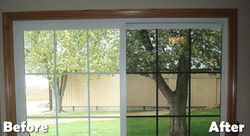
 |  |  |
|---|---|---|
 |  |  |
 |  |
Key Benefits to Tinting your home or business
Energy Efficiency: Window tinting can significantly reduce the amount of heat entering your space during hot summer months. This helps to lower cooling costs as your HVAC system doesn't have to work as hard to maintain a comfortable temperature. In winter, some types of window films can also provide insulation to keep heat inside.
UV Protection: Window tinting can block a significant portion of harmful ultraviolet (UV) rays from the sun. UV rays can fade and damage furniture, flooring, artwork, and other valuables. Tinted windows can help preserve the aesthetics and longevity of your interior furnishings.
Glare Reduction: Tinted windows can reduce glare from direct sunlight, which can improve visibility and comfort, particularly in office spaces with computer screens or in rooms with televisions. This can enhance productivity and create a more pleasant environment.
Privacy: Depending on the level of tint, window films can offer varying degrees of privacy. This is particularly important for businesses that require confidentiality or homes in close proximity to neighbors. Tinting can provide privacy without sacrificing natural light.
Security: Some window films are designed to enhance window security. They can make it more difficult for intruders to break the glass, potentially deterring burglaries. In case of breakage, the film can also hold shattered glass together, reducing the risk of injury.
Aesthetics: Window tinting can enhance the appearance of your home or business by providing a uniform and sleek look to the windows. It can complement architectural designs and add a touch of sophistication.
Reduced Fading: Tinted windows can protect the interior of your space from fading and discoloration caused by sun exposure. This is particularly important for businesses that showcase merchandise or homes with valuable artwork and decor.
Noise Reduction: Some window films have soundproofing properties that can help reduce external noise, providing a quieter and more peaceful environment indoors.
Eco-Friendly: By reducing the need for excessive air conditioning during hot weather, window tinting can contribute to energy conservation and lower carbon emissions, making it an environmentally friendly choice.
Cost-Effective: While there is an upfront cost to install window tinting, the long-term energy savings, reduced maintenance, and improved longevity of furnishings can result in cost savings over time.
Regulatory Compliance: In some areas, window tinting may be required for regulatory compliance, such as safety and energy efficiency codes.
It's essential to choose the right type of window tinting film for your specific needs and preferences. Factors to consider include the level of tint, the type of film (e.g., reflective, ceramic, or dyed), and any local regulations or building codes that may apply. Consulting with a professional installer can help you make the best choice for your home or business



